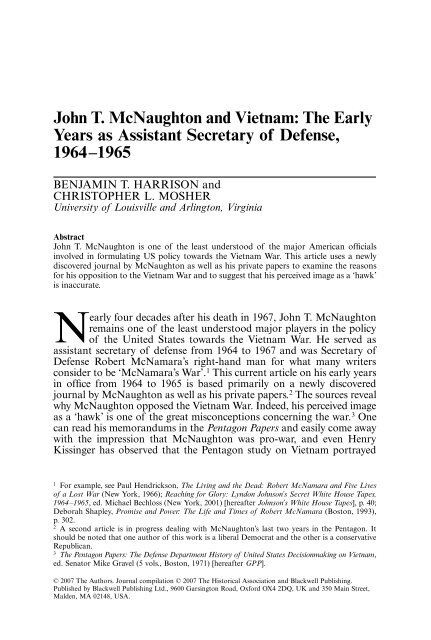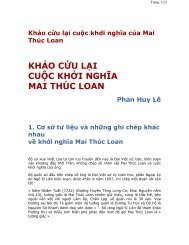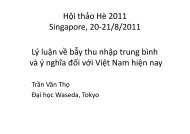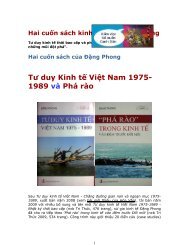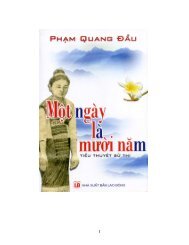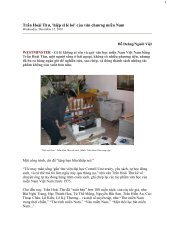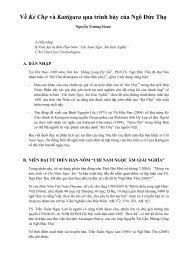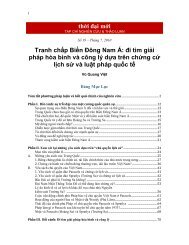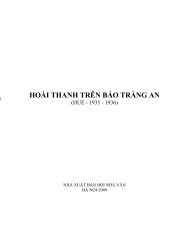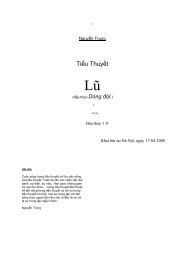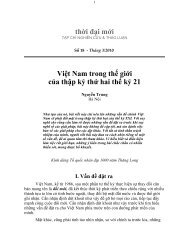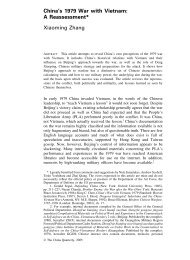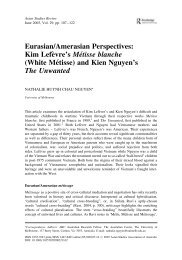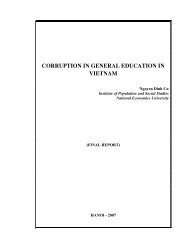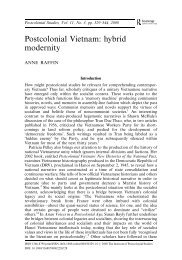John T. McNaughton and Vietnam: The Early Years as ... - Viet-studies
John T. McNaughton and Vietnam: The Early Years as ... - Viet-studies
John T. McNaughton and Vietnam: The Early Years as ... - Viet-studies
Create successful ePaper yourself
Turn your PDF publications into a flip-book with our unique Google optimized e-Paper software.
Blackwell Oxford, HIST History 0018-2648 © XXX Original JOHN BENJAMIN 2007 T. <strong>The</strong> UK Articles MCNAUGHTON Publishing Historical T. HARRISON Ltd Association AND <strong>and</strong> VIETNAM CHRISTOPHER Blackwell Publishing L. MOSHER Ltd.<br />
<strong>John</strong> T. <strong>McNaughton</strong> <strong>and</strong> <strong><strong>Viet</strong>nam</strong>: <strong>The</strong> <strong>Early</strong><br />
<strong>Years</strong> <strong>as</strong> Assistant Secretary of Defense,<br />
1964–1965<br />
BENJAMIN T. HARRISON <strong>and</strong><br />
CHRISTOPHER L. MOSHER<br />
University of Louisville <strong>and</strong> Arlington, Virginia<br />
Abstract<br />
<strong>John</strong> T. <strong>McNaughton</strong> is one of the le<strong>as</strong>t understood of the major American officials<br />
involved in formulating US policy towards the <strong><strong>Viet</strong>nam</strong> War. This article uses a newly<br />
discovered journal by <strong>McNaughton</strong> <strong>as</strong> well <strong>as</strong> his private papers to examine the re<strong>as</strong>ons<br />
for his opposition to the <strong><strong>Viet</strong>nam</strong> War <strong>and</strong> to suggest that his perceived image <strong>as</strong> a ‘hawk’<br />
is inaccurate.<br />
Nearly four decades after his death in 1967, <strong>John</strong> T. <strong>McNaughton</strong><br />
remains one of the le<strong>as</strong>t understood major players in the policy<br />
of the United States towards the <strong><strong>Viet</strong>nam</strong> War. He served <strong>as</strong><br />
<strong>as</strong>sistant secretary of defense from 1964 to 1967 <strong>and</strong> w<strong>as</strong> Secretary of<br />
Defense Robert McNamara’s right-h<strong>and</strong> man for what many writers<br />
consider to be ‘McNamara’s War’. 1 This current article on his early years<br />
in office from 1964 to 1965 is b<strong>as</strong>ed primarily on a newly discovered<br />
journal by <strong>McNaughton</strong> <strong>as</strong> well <strong>as</strong> his private papers. 2 <strong>The</strong> sources reveal<br />
why <strong>McNaughton</strong> opposed the <strong><strong>Viet</strong>nam</strong> War. Indeed, his perceived image<br />
<strong>as</strong> a ‘hawk’ is one of the great misconceptions concerning the war. 3 One<br />
can read his memor<strong>and</strong>ums in the Pentagon Papers <strong>and</strong> e<strong>as</strong>ily come away<br />
with the impression that <strong>McNaughton</strong> w<strong>as</strong> pro-war, <strong>and</strong> even Henry<br />
Kissinger h<strong>as</strong> observed that the Pentagon study on <strong><strong>Viet</strong>nam</strong> portrayed<br />
1 For example, see Paul Hendrickson, <strong>The</strong> Living <strong>and</strong> the Dead: Robert McNamara <strong>and</strong> Five Lives<br />
of a Lost War (New York, 1966); Reaching for Glory: Lyndon <strong>John</strong>son’s Secret White House Tapes,<br />
1964–1965,<br />
ed. Michael Bechloss (New York, 2001) [hereafter <strong>John</strong>son’s White House Tapes],<br />
p. 40;<br />
Deborah Shapley, Promise <strong>and</strong> Power: <strong>The</strong> Life <strong>and</strong> Times of Robert McNamara (Boston, 1993),<br />
p. 302.<br />
2 A second article is in progress dealing with <strong>McNaughton</strong>’s l<strong>as</strong>t two years in the Pentagon. It<br />
should be noted that one author of this work is a liberal Democrat <strong>and</strong> the other is a conservative<br />
Republican.<br />
3<br />
<strong>The</strong> Pentagon Papers: <strong>The</strong> Defense Department History of United States Decisionmaking on <strong><strong>Viet</strong>nam</strong>,<br />
ed. Senator Mike Gravel (5 vols., Boston, 1971) [hereafter GPP].<br />
© 2007 <strong>The</strong> Authors. Journal compilation © 2007 <strong>The</strong> Historical Association <strong>and</strong> Blackwell Publishing.<br />
Published by Blackwell Publishing Ltd., 9600 Garsington Road, Oxford OX4 2DQ, UK <strong>and</strong> 350 Main Street,<br />
Malden, MA 02148, USA.
BENJAMIN T. HARRISON AND CHRISTOPHER L. MOSHER 497<br />
him unfairly. 4 Moreover, Robert McNamara h<strong>as</strong> categorically denied<br />
that his <strong>as</strong>sistant w<strong>as</strong> ever a ‘secret dove’. 5 Obviously the former secretary<br />
of defense, who made only a few obscure references to <strong>McNaughton</strong> in<br />
his memoirs, is best served by making his own evolution to dove status a<br />
solitary one to his own personal credit alone. But all is not so simple, <strong>as</strong><br />
is made clear in this article which sheds new light on both <strong>McNaughton</strong><br />
<strong>and</strong> McNamara.<br />
Obviously there were not many doves in the Kennedy <strong>and</strong> <strong>John</strong>son<br />
administrations. 6 <strong>John</strong> <strong>McNaughton</strong> w<strong>as</strong> unusual not only <strong>as</strong> an opponent<br />
of the <strong><strong>Viet</strong>nam</strong> War but also because he w<strong>as</strong> a Midwesterner in what w<strong>as</strong><br />
a predominately Northe<strong>as</strong>tern establishment. He grew up in Pekin, Illinois<br />
(b. 1921), where his father owned a newspaper. He became its editor<br />
(1951–2) after serving in the Second World War, a stint <strong>as</strong> a Rhodes<br />
Scholar <strong>and</strong> completing his legal <strong>studies</strong>. He ran unsuccessfully for<br />
Congress in 1952 <strong>and</strong> the next year joined the faculty of Harvard Law<br />
School. He became deputy <strong>as</strong>sistant secretary of defense for arms control<br />
in 1961 <strong>and</strong> established his reputation <strong>as</strong> one of the leading experts of the<br />
day on nuclear disarmament <strong>as</strong> well <strong>as</strong> playing a role in negotiating the<br />
Nuclear Test Ban Treaty (1963). His fervent support for limiting nuclear<br />
weapons would certainly endear him to Robert McNamara because<br />
McNamara h<strong>as</strong> campaigned tirelessly for nuclear disarmament.<br />
Nevertheless, <strong>McNaughton</strong> <strong>and</strong> McNamara had their differences.<br />
Indeed, <strong>McNaughton</strong>’s previous involvement with elective politics <strong>and</strong><br />
McNamara’s total lack of political experience would separate the two on<br />
<strong><strong>Viet</strong>nam</strong> policy. <strong>The</strong> secretary of defense w<strong>as</strong> more typical of the<br />
‘Camelot’ group <strong>as</strong>sociated with President <strong>John</strong> Kennedy that had never<br />
run for political office. <strong>The</strong>se individuals lacked a feeling for American<br />
public sentiment on the war <strong>and</strong> for the <strong><strong>Viet</strong>nam</strong>ese thirst for independence.<br />
When President Lyndon <strong>John</strong>son bragged to his mentor, House<br />
Speaker Sam Rayburn, about the illustrious staff he had inherited from<br />
Kennedy, the response w<strong>as</strong> the sage observation, ‘Well, Lyndon, you<br />
might be right <strong>and</strong> they may be every bit <strong>as</strong> intelligent <strong>as</strong> you say, but I’d<br />
feel a whole lot better about them if just one of them had run for sheriff<br />
once.’ 7 With elective office not in their background, it w<strong>as</strong> e<strong>as</strong>y for them<br />
to ignore public opposition at home <strong>and</strong> abroad. <strong>John</strong>son should have<br />
paid more attention to that reality, but it is one of the many facts he<br />
ignored concerning <strong><strong>Viet</strong>nam</strong>. McNamara w<strong>as</strong> once <strong>as</strong>ked why he had<br />
turned down the vice-presidential ticket in 1964. ‘I really believed,’ he<br />
replied, ‘I w<strong>as</strong> totally incompetent to run with no experience on an<br />
4 Inside the Pentagon Papers,<br />
ed. <strong>John</strong> Prad<strong>as</strong> <strong>and</strong> Margaret P. Porter (Lawrence, Kan., 2004)<br />
[hereafter Inside the Pentagon Papers], p. 78.<br />
5 Question posed by Benjamin Harrison during the ‘Question <strong>and</strong> Answer’ period following Robert<br />
McNamara’s talk on ‘World Security’ at University of Louisville, Louisville, Kentucky, 2 Dec.<br />
2002. Further attempts to interview McNamara were declined.<br />
6 David Halberstam, <strong>The</strong> Best <strong>and</strong> the Brightest (New York, 1972) [hereafter Halberstam, Best <strong>and</strong><br />
Brightest].<br />
7 Ibid., p. 53.<br />
© 2007 <strong>The</strong> Authors. Journal compilation © 2007 <strong>The</strong> Historical Association <strong>and</strong> Blackwell Publishing.
498 JOHN T. MCNAUGHTON AND VIETNAM<br />
elected office campaign.’ 8 It would be <strong>McNaughton</strong>, <strong>as</strong> will be seen, who<br />
had his h<strong>and</strong> on the pulse of the American electorate <strong>as</strong> well <strong>as</strong> the <strong><strong>Viet</strong>nam</strong>ese.<br />
At one point in 1965 when an <strong>as</strong>sistant mentioned the difficulty<br />
of the United States getting out of <strong><strong>Viet</strong>nam</strong>, <strong>McNaughton</strong> would make<br />
the comment, ‘Surely no one thinks we can perform lobotomies on all<br />
indigenous VC!’<br />
9<br />
<strong>McNaughton</strong>’s reference to altering <strong><strong>Viet</strong>nam</strong>ese minds<br />
goes to the heart of his opposition to the <strong><strong>Viet</strong>nam</strong> War. Had national<br />
elections under the Geneva Accords actually taken place, US officials<br />
estimated that Ho Chi Minh would have received perhaps 80 per cent of<br />
the vote.<br />
10<br />
It would have taken lobotomies to change that stark political<br />
reality <strong>and</strong> <strong>McNaughton</strong> appreciated the importance of popular will in<br />
the <strong><strong>Viet</strong>nam</strong> situation.<br />
Few officials in W<strong>as</strong>hington, however, were particularly interested in<br />
the domestic will of the <strong><strong>Viet</strong>nam</strong>ese people in the mid-1960s. One exception<br />
w<strong>as</strong> <strong>John</strong> T. <strong>McNaughton</strong>, who became <strong>as</strong>sistant secretary of defense for<br />
International Security in March 1964. He shared his views on <strong><strong>Viet</strong>nam</strong><br />
with his boss, Robert McNamara, <strong>and</strong> a close circle of colleagues. When<br />
his ide<strong>as</strong> were rejected, he kept trying alternative ways to get the United<br />
States out of <strong><strong>Viet</strong>nam</strong>. He w<strong>as</strong>, however, careful not to contradict<br />
McNamara in government meetings. President <strong>John</strong>son w<strong>as</strong> not the<br />
type of individual to reward dissent <strong>and</strong> neither w<strong>as</strong> McNamara.<br />
<strong>McNaughton</strong> could see that Undersecretary of State George Ball w<strong>as</strong><br />
not receiving any promotions for being a nay-sayer. His closest friend in<br />
government to whom he confided w<strong>as</strong> Michael Forrestal of the National<br />
Security Council <strong>and</strong> Forrestal’s own government career would end in<br />
shambles. He left government service convinced that <strong>John</strong>son did not<br />
tolerate differences <strong>and</strong> that people were afraid to speak their minds.<br />
That atmosphere is well illustrated by a story in which President <strong>John</strong>son<br />
tells his aides, Jack Valenti <strong>and</strong> Walter Jenkins, that when they considered<br />
government appointees, they were ‘to swear ’em into loyalty <strong>and</strong> devotion<br />
<strong>and</strong> do or die, right or wrong’.<br />
12<br />
With that environment, it is little wonder<br />
few people spoke up <strong>and</strong> voiced dissenting views at government meetings.<br />
<strong>McNaughton</strong> noted in his diary that the atmosphere in the nation’s<br />
capital w<strong>as</strong> like ‘the l<strong>as</strong>t days of Stalin’ when ‘no one could tell his woes<br />
to anyone for fear he would be turned, <strong>and</strong> done, in.’ 13<br />
8 Oral Interview by Robert Dallek, 26 March 1993, Lyndon B. <strong>John</strong>son Library [LBJL], Austin,<br />
Tex<strong>as</strong>.<br />
9 Papers of <strong>John</strong> T. <strong>McNaughton</strong> [JTM Papers], found in the Paul Warnke Papers, LBJL Box 1,<br />
File 1, #15, memo dated 12 Dec. 1965.<br />
10 Dwight D. Eisenhower, <strong>The</strong> White House <strong>Years</strong>,<br />
i: M<strong>and</strong>ate for Change, 1953–1956 (New York,<br />
1963) [hereafter Eisenhower, M<strong>and</strong>ate for Change],<br />
p. 372. British Intelligence placed the figure at<br />
90 per cent. William Bundy confirmed the support for Ho in a memo of 15 April 1965. See Kai<br />
Bird, <strong>The</strong> Color of Truth: McGeorge <strong>and</strong> William Bundy, Brothers in Arms (New York, 1998) [hereafter<br />
Bird Color of Truth],<br />
p. 451, fn. 62. Also see GPP,<br />
i. 52.<br />
11 Oral Interview by Paige E. Mulhollan, 3 Nov. 1969, LBJL, pp. 29–30.<br />
12 <strong>John</strong>son’s White House Tapes,<br />
p. 122.<br />
13 <strong>McNaughton</strong> Diary, 6 Jan. 1966, p. 13, Alex <strong>McNaughton</strong>’s Files, with a photocopy in the<br />
current author’s files.<br />
© 2007 <strong>The</strong> Authors. Journal compilation © 2007 <strong>The</strong> Historical Association <strong>and</strong> Blackwell Publishing.<br />
11
BENJAMIN T. HARRISON AND CHRISTOPHER L. MOSHER 499<br />
George Ball is generally regarded <strong>as</strong> the lone dove in the Kennedy<br />
<strong>and</strong> <strong>John</strong>son administrations. He w<strong>as</strong> known to be a eurocentrist so that<br />
colleagues e<strong>as</strong>ily ignored his opposition. 14 But <strong>McNaughton</strong>’s views were<br />
not so e<strong>as</strong>y to dismiss. Besides, Ball’s job in the state department w<strong>as</strong> to<br />
develop strategies <strong>and</strong> policies. <strong>McNaughton</strong>’s job in the Pentagon w<strong>as</strong><br />
to formulate options <strong>and</strong> tactics for implementing policy. When Ball<br />
dissented, he made it clear that whatever policy w<strong>as</strong> decided upon, he<br />
w<strong>as</strong> ‘committed’. 15 By contr<strong>as</strong>t, <strong>McNaughton</strong> saw himself in the role of<br />
an unbi<strong>as</strong>ed attorney defending a client. He would make his c<strong>as</strong>e to<br />
McNamara <strong>and</strong>, if his arguments were rejected, he would move on to<br />
fight another day. After all, it w<strong>as</strong> clear that <strong>John</strong>son could not conceive<br />
of defeat in <strong><strong>Viet</strong>nam</strong>. Moreover, the commitment that led to a major<br />
escalation of the <strong><strong>Viet</strong>nam</strong> War had already been made by the time<br />
<strong>McNaughton</strong> became <strong>as</strong>sistant secretary of defense in 1964. He had to<br />
select bombing targets even <strong>as</strong> he presented re<strong>as</strong>ons for getting out of<br />
<strong><strong>Viet</strong>nam</strong>. His colleague at Harvard, Roger Fisher, explained:<br />
<strong>McNaughton</strong> did more sustained thinking about the benefits of both<br />
escalation <strong>and</strong> withdrawal than any of the advocates of either position . . .<br />
He w<strong>as</strong> an expert on dealing within the realm of the possible. If it seemed<br />
certain that an idea would not now be accepted, he would bide his time. 16<br />
Alternatives were not e<strong>as</strong>y to come by in a war that <strong>McNaughton</strong> had<br />
already said would require lobotomies for success. As he so shrewdly<br />
observed, the situation in <strong><strong>Viet</strong>nam</strong> w<strong>as</strong> a c<strong>as</strong>e of the United States giving<br />
illegitimate birth to South <strong><strong>Viet</strong>nam</strong>.<br />
© 2007 <strong>The</strong> Authors. Journal compilation © 2007 <strong>The</strong> Historical Association <strong>and</strong> Blackwell Publishing.<br />
17<br />
In his opinion, the United States<br />
had given birth to a country that had no legitimacy because its own people<br />
did not support it.<br />
<strong>John</strong> <strong>McNaughton</strong> w<strong>as</strong> convinced that the lack of popular support for<br />
the government of South <strong><strong>Viet</strong>nam</strong> w<strong>as</strong> the main re<strong>as</strong>on why the United<br />
States should not even be there in the first place. James C. Thomson, Jr.,<br />
an aide to the Bundy brothers<br />
18<br />
at various times, talked to <strong>McNaughton</strong><br />
about what w<strong>as</strong> wrong with US involvement in <strong><strong>Viet</strong>nam</strong>. <strong>The</strong> <strong>as</strong>sistant<br />
secretary of defense sarc<strong>as</strong>tically responded, ‘You don’t really think we<br />
should be there?’ When Thomson left government in 1966, <strong>McNaughton</strong><br />
tried to persuade him to stay on <strong>as</strong> a staff member in the Pentagon.<br />
Thomson responded that would be hard for a ‘through <strong>and</strong> through<br />
deep-dyed peacenik’. <strong>McNaughton</strong> quickly replied, ‘Do they know that<br />
on the outside?’ Thomson answered that he did not think anyone outside<br />
the government knew of his dovishness. <strong>McNaughton</strong> w<strong>as</strong> ecstatic,<br />
See David L. DiLeo,<br />
14<br />
1991).<br />
15<br />
George Ball, <strong><strong>Viet</strong>nam</strong> <strong>and</strong> the Rethinking of Containment (Chapel Hill, NC,<br />
A. J. Langguth, Our <strong><strong>Viet</strong>nam</strong>: <strong>The</strong> War, 1954–1975 (New York, 2000) [hereafter Langguth, Our<br />
<strong><strong>Viet</strong>nam</strong>],<br />
p. 378.<br />
16 ‘Letter to the Editor’, New Republic,<br />
5 Sept. 1967, p. 44.<br />
17 JTM Papers, Box 2, File V, #34, 5 Nov. 1964, LBJL.<br />
18 McGeorge Bundy served <strong>as</strong> National Security Advisor. His brother, William P. Bundy, w<strong>as</strong><br />
<strong>McNaughton</strong>’s predecessor at the Pentagon before becoming <strong>as</strong>sistant secretary of state.
500 JOHN T. MCNAUGHTON AND VIETNAM<br />
saying, ‘That’s all we want. What we need here is peaceniks.’ 19 His wit<br />
similarly shines through in so many of his memor<strong>and</strong>ums found in his<br />
private papers. In perhaps the most revealing memo on why he opposed<br />
the war, he h<strong>and</strong>-drafted six re<strong>as</strong>ons in June 1965. To begin with,<br />
<strong>McNaughton</strong> did not believe <strong><strong>Viet</strong>nam</strong> w<strong>as</strong> in the ‘sphere of influence’ of<br />
the United States. Furthermore, he insisted the enemy in <strong><strong>Viet</strong>nam</strong> had<br />
no other option but to resort to arms because there w<strong>as</strong> no available<br />
democratic process to obtain political power. He then noted that he<br />
admired the spirit <strong>and</strong> morale of the enemy in <strong><strong>Viet</strong>nam</strong> <strong>and</strong> criticized the<br />
Saigon government <strong>as</strong> ‘slobs’. He w<strong>as</strong> convinced that the weak <strong>and</strong> poor<br />
in <strong><strong>Viet</strong>nam</strong> should prevail over the ‘elite’. And l<strong>as</strong>tly, <strong>McNaughton</strong><br />
concluded that <strong><strong>Viet</strong>nam</strong> should be an independent, unified country with<br />
its destiny determined by the <strong><strong>Viet</strong>nam</strong>ese themselves.<br />
© 2007 <strong>The</strong> Authors. Journal compilation © 2007 <strong>The</strong> Historical Association <strong>and</strong> Blackwell Publishing.<br />
20<br />
No one knew<br />
better than <strong>John</strong> <strong>McNaughton</strong> that the v<strong>as</strong>t majority of <strong><strong>Viet</strong>nam</strong>ese<br />
would vote for Ho Chi Minh. Thus, South <strong><strong>Viet</strong>nam</strong> w<strong>as</strong> a congenital<br />
impossibility <strong>and</strong> he believed the only hope of successfully maintaining<br />
its existence would be to perform lobotomies on all <strong><strong>Viet</strong>nam</strong>ese.<br />
When <strong>McNaughton</strong> arrived at the Pentagon early in 1964, the war in<br />
<strong><strong>Viet</strong>nam</strong> w<strong>as</strong> in the process of becoming ‘Americanized’. Officially, the<br />
year began with the United States ‘<strong>as</strong>sisting’ the South <strong><strong>Viet</strong>nam</strong>ese<br />
governments in their efforts against the ‘eighty per cent’ of <strong><strong>Viet</strong>nam</strong>ese<br />
who supported Ho Chi Minh. By the end of the year, the government of<br />
South <strong><strong>Viet</strong>nam</strong> (GVN) would be going through the motions of ‘<strong>as</strong>sisting’<br />
the United States. <strong>McNaughton</strong> faced the daunting t<strong>as</strong>k of developing<br />
policy options to remedy the deteriorating situation in <strong><strong>Viet</strong>nam</strong>, which<br />
w<strong>as</strong> so bad that he believed the Saigon government might ‘go down the<br />
drain’.<br />
21<br />
He w<strong>as</strong> ready to say good riddance to <strong><strong>Viet</strong>nam</strong>. A working<br />
paper found in <strong>McNaughton</strong>’s files for 1964 <strong>as</strong>ked the question: ‘What if<br />
the GVN collapses . . . ?’ A section addressed the issue of ‘answers’ with<br />
these possibilities:<br />
a. Seek to reestablish viable government . . .<br />
b. Establish figurehead. . . .<br />
c. If all of above fails, cut losses <strong>and</strong> negotiate settlement. 22<br />
<strong>The</strong> <strong>as</strong>sistant defense secretary w<strong>as</strong> evidently thinking the unthinkable:<br />
the United States should ‘cut losses’ <strong>and</strong> get out of <strong><strong>Viet</strong>nam</strong>.<br />
<strong>McNaughton</strong> confided his dark thoughts to individuals like presidential<br />
aide Michael Forrestal, who in 1964 w<strong>as</strong> still opposed to the option of<br />
cutting losses just <strong>as</strong> w<strong>as</strong> McNamara. He would say, ‘the trouble with<br />
you Forrestal is that you think we can turn this thing off, <strong>and</strong> that we can<br />
get out whenever we want. But I wonder. I think if it w<strong>as</strong> e<strong>as</strong>y to get off<br />
19 Oral Interview by Paige Mulhollan, 22 July 1971, LJBL.<br />
20 JTM Papers, Box 1, File IV, 1965, #59, June 1965, LBJL; although it is unsigned, his son h<strong>as</strong><br />
confirmed it is his father’s h<strong>and</strong>writing <strong>and</strong> it indeed matches his journal penmanship.<br />
21 Memo found in JTM Papers, Box 2, File V, #32, File for 1964 memos, undated.<br />
22 JTM Papers, Box 8 File III, unsigned <strong>and</strong> undated, #16 <strong>and</strong> 16a.
BENJAMIN T. HARRISON AND CHRISTOPHER L. MOSHER 501<br />
of it, we would have gotten off.’ <strong>McNaughton</strong> w<strong>as</strong> convinced that, <strong>as</strong> the<br />
United States got deeper <strong>and</strong> deeper into the <strong><strong>Viet</strong>nam</strong> War during 1964,<br />
it would become harder <strong>and</strong> harder to pull out. He insisted, ‘each day we<br />
lose a little control, each decision that we make wrong, or didn’t make<br />
at all, makes the next decision a little bit harder because if we haven’t<br />
stopped it today, then the re<strong>as</strong>ons for not stopping it will still exist<br />
tomorrow <strong>and</strong> we’ll be in even deeper’.<br />
© 2007 <strong>The</strong> Authors. Journal compilation © 2007 <strong>The</strong> Historical Association <strong>and</strong> Blackwell Publishing.<br />
23<br />
In 1964, <strong>McNaughton</strong> must<br />
have felt <strong>as</strong> if he w<strong>as</strong> beating his head against a brick wall in the Pentagon,<br />
<strong>and</strong> his views were made known to all his close <strong>as</strong>sociates <strong>and</strong> above all<br />
to Robert McNamara. In the end, <strong>McNaughton</strong> concluded that progress<br />
in <strong><strong>Viet</strong>nam</strong> w<strong>as</strong> ‘unlikely despite our best ide<strong>as</strong> <strong>and</strong> efforts’.<br />
24<br />
It w<strong>as</strong> an<br />
impossible situation with no solution available.<br />
In March 1964, the National Security Council (NSC) Paper #288<br />
(also known <strong>as</strong> NSAM 288) w<strong>as</strong> completed. Although <strong>McNaughton</strong><br />
h<strong>as</strong> mistakenly been credited <strong>as</strong> its author, 25 William P. Bundy, <strong>as</strong>sistant<br />
secretary of state for E<strong>as</strong>tern Affairs, h<strong>as</strong> stated in his unpublished history<br />
of the war that he wrote NSAM 288. It w<strong>as</strong> a very bellicose document<br />
putting forth the domino theory at the heart of American strategy.<br />
fact, the domino theory w<strong>as</strong> soundly rejected by <strong>McNaughton</strong>. In 1964,<br />
a memo in his files concludes, ‘We do not believe that the loss of South<br />
<strong><strong>Viet</strong>nam</strong> <strong>and</strong> Laos would be followed by the rapid, successive commun-<br />
ization of the other states of the Far E<strong>as</strong>t.’<br />
27<br />
26<br />
In<br />
By May 1964, even Forrestal<br />
w<strong>as</strong> having second thoughts about <strong><strong>Viet</strong>nam</strong> policy <strong>and</strong> this time it w<strong>as</strong><br />
<strong>McNaughton</strong> who got an earful from his confidant about the economic<br />
costs of counter-insurgency. Forrestal later apologized <strong>and</strong> wrote to<br />
<strong>McNaughton</strong>, ‘Pardon my “reactive” logic in the elevator this afternoon’.<br />
He added that he had ‘come to the point myself where I am beginning to<br />
question whether we can learn f<strong>as</strong>t enough to avoid dis<strong>as</strong>ter in Southe<strong>as</strong>t<br />
Asia’.<br />
28<br />
Forrestal w<strong>as</strong> actually recognizing what <strong>McNaughton</strong> had known<br />
all along. <strong>The</strong> United States w<strong>as</strong> not winning the hearts <strong>and</strong> minds of the<br />
<strong><strong>Viet</strong>nam</strong>ese people. National Security Council staffer Chester Cooper<br />
also came to acknowledge the validity of <strong>McNaughton</strong>’s view on the<br />
23 Halberstam, Best <strong>and</strong> Brightest,<br />
p. 368; <strong>and</strong> H. R. McM<strong>as</strong>ter, Dereliction of Duty: Lyndon <strong>John</strong>son,<br />
Robert McNamara, the Joint Chiefs of Staff, <strong>and</strong> the Lies that Led to <strong><strong>Viet</strong>nam</strong> (New York, 1997),<br />
p. 183.<br />
24 GPP,<br />
iii. 212. Forrestal apparently remained a ‘soft hawk’. On this see Andrew Preston, ‘<strong>The</strong><br />
Soft Hawk’s Dilemma in <strong><strong>Viet</strong>nam</strong>: Michael V. Forrestal at the National Security Council, 1962–<br />
1964’, International History Review,<br />
xxv (2003), 63–95. Joseph Kraft came to similar conclusions<br />
in his December 1964 article for Harper’s titled ‘A Way out of <strong><strong>Viet</strong>nam</strong>’, b<strong>as</strong>ed on cl<strong>and</strong>estine<br />
interviews with members of government.<br />
25 Halberstam, Best <strong>and</strong> Brightest,<br />
p. 354.<br />
26 William P. Bundy, <strong><strong>Viet</strong>nam</strong> Manuscript, William P. Bundy Papers, Box 1, ch. 12, p. 21, LBJL.<br />
27 JTM Papers, Box 2, File V, #36, ‘memor<strong>and</strong>um for the director’, 9 June 1964, LBJL. <strong>The</strong> memo<br />
w<strong>as</strong> in his files because he considered himself to be one of the ‘we’ referred to in the quote. It w<strong>as</strong><br />
drafted by CIA staff member, Sherman Kent, for the Board of National Estimates <strong>as</strong> found in US<br />
Department of State, Foreign Relations of the United States: 1964, <strong><strong>Viet</strong>nam</strong>,<br />
i (W<strong>as</strong>hington, DC,<br />
1965–2000) [hereafter FRUS],<br />
p. 995.<br />
28 Michael Forrestal to <strong>John</strong> <strong>McNaughton</strong>, 1 May 1964, Papers of Lyndon <strong>John</strong>son, National<br />
Security File – <strong><strong>Viet</strong>nam</strong>, Box 4, LBJL.
502 JOHN T. MCNAUGHTON AND VIETNAM<br />
war. Cooper w<strong>as</strong> later <strong>as</strong>ked if the dovish views on <strong><strong>Viet</strong>nam</strong> within the<br />
government came from ‘<strong>McNaughton</strong>’s shop, particularly’. He answered<br />
in the affirmative. 29<br />
With the autumn of 1964 bringing the Gulf of Tonkin Incident30<br />
<strong>and</strong><br />
the excuse the administration would use for retaliatory military escalation,<br />
<strong>McNaughton</strong> found himself in a personal dilemma. Forrestal insisted,<br />
‘<strong>The</strong>re were a number of people, <strong>and</strong> I w<strong>as</strong> part of that number, who<br />
didn’t believe in this retaliatory thing at all.’ 31 <strong>McNaughton</strong> w<strong>as</strong> part of<br />
the group opposing retaliatory bombing of North <strong><strong>Viet</strong>nam</strong>, but that<br />
group notably did not include McNamara. <strong>The</strong> situation in South<br />
<strong><strong>Viet</strong>nam</strong> w<strong>as</strong> deteriorating <strong>and</strong> pressure mounted from within the <strong>John</strong>son<br />
administration to bomb North <strong><strong>Viet</strong>nam</strong>. As David Halberstam h<strong>as</strong> said,<br />
‘no one argued more forcefully with his immediate superior’ against<br />
escalation than <strong>John</strong> <strong>McNaughton</strong>. 32 However, if one relies only on<br />
<strong>McNaughton</strong>’s writings which have been published in the Pentagon<br />
Papers,<br />
the opposite appears to be true because he authored countless<br />
memor<strong>and</strong>a focusing on the bombing programme even <strong>as</strong> he opposed<br />
the war. One of his staffers observed that, when seeing <strong>McNaughton</strong>’s<br />
private papers after he w<strong>as</strong> killed in the plane accident of 1967, it w<strong>as</strong><br />
like looking at a secret <strong>McNaughton</strong>. 33 Memo after memo in these files<br />
show that he urged a negotiated settlement on even unfavourable terms<br />
believing the GVN ‘had almost no legitimacy in the eyes of its citizens’. 34<br />
His diary presents the same evidence. <strong>McNaughton</strong> believed ‘the situation<br />
is deteriorating rapidly in South <strong><strong>Viet</strong>nam</strong>, <strong>and</strong> the trend is not likely to<br />
change.’ 35 He urged direct communication with the government in<br />
Hanoi. But in September, after the Gulf of Tonkin Incident, few officials<br />
in the <strong>John</strong>son administration were eager to open lines of communication<br />
with Hanoi. <strong>The</strong> Joint Chiefs of Staff (JCS) <strong>and</strong> McNamara favoured<br />
bombing. So the ‘options man’, <strong>John</strong> <strong>McNaughton</strong>, proposed a ‘Plan of<br />
Action’ that aimed to satisfy the dem<strong>and</strong>s of his boss. <strong>The</strong> memo outlined<br />
air strikes on infiltration routes, co<strong>as</strong>tal raids on North <strong><strong>Viet</strong>nam</strong> <strong>and</strong> more<br />
naval patrols in the Gulf of Tonkin, but <strong>as</strong> the analysts of the Pentagon<br />
Papers concluded, he urged that the pace of escalation ‘be slowed down’.<br />
<strong>McNaughton</strong> wanted ‘to preserve where possible the option to have no<br />
U.S. military action at all’. 36<br />
29 Oral interview by Paige Mulhollan, 9 July 1969, LBJL.<br />
30 In August 1964, US ships in the Gulf of Tonkin were fired upon by the North <strong><strong>Viet</strong>nam</strong>ese.<br />
31 Oral Interview by Paige Mulhollan, 3 Nov. 1969, LBJL.<br />
32 Halberstam, Best <strong>and</strong> Brightest, p. 362.<br />
33 Ibid. Halberstam identified the source of that reference <strong>as</strong> Richard Ullman in a correspondence<br />
dated 5 April 2001, David Halberstam to Benjamin Harrison, author’s private files. Ullman did not<br />
respond to this reference in e-mail correspondence.<br />
34 Robert Topmiller, ‘A Missed Opportunity for Peace, Victory – 1966’, Peace <strong>and</strong> Change, xxvii<br />
(2002), 60; see also Topmiller’s <strong>The</strong> Lotus Unle<strong>as</strong>hed: <strong>The</strong> Buddhist Peace Movement in South <strong><strong>Viet</strong>nam</strong><br />
(Lexington, Ky., 2002), p. 362.<br />
35 FRUS, 1964, <strong><strong>Viet</strong>nam</strong>, i. 793.<br />
36 <strong>The</strong> Pentagon Papers <strong>as</strong> Published by the New York Times, ed. New York Times (New York, 1971)<br />
[hereafter NYTPP], pp. 308–9, 355–7; GPP, iii. 204–5, 222.<br />
© 2007 <strong>The</strong> Authors. Journal compilation © 2007 <strong>The</strong> Historical Association <strong>and</strong> Blackwell Publishing.
BENJAMIN T. HARRISON AND CHRISTOPHER L. MOSHER 503<br />
<strong>McNaughton</strong>’s job at the Pentagon may have required the formulation<br />
of bombing plans, but he believed the United States should never have<br />
been in <strong><strong>Viet</strong>nam</strong> at all. Others within the administration spoke out<br />
against military escalation when the Tonkin crisis occurred. For example,<br />
George Ball continued to argue against involvement in <strong><strong>Viet</strong>nam</strong> <strong>and</strong> he<br />
<strong>and</strong> <strong>McNaughton</strong> were briefly joined by William P. Bundy, who w<strong>as</strong><br />
<strong>McNaughton</strong>’s predecessor in the Pentagon. Bundy wrote a 42-page<br />
memo saying, ‘Americans should walk away from <strong><strong>Viet</strong>nam</strong>’. His biographer<br />
says never again would Bundy attempt to make such a c<strong>as</strong>e because of<br />
the criticism it received from Rusk <strong>and</strong> McNamara. 37 Clearly, ‘American<br />
decision makers in 1964–1965 did not walk blindly into the <strong><strong>Viet</strong>nam</strong><br />
quagmire . . . <strong>The</strong>y were under no illusions’, <strong>as</strong> one scholar h<strong>as</strong> so ably<br />
argued. 38 <strong>The</strong> voices of criticism make it untenable to argue in favour of<br />
the quagmire theory, which maintains that the United States accidentally<br />
got pulled into <strong><strong>Viet</strong>nam</strong> without planning <strong>and</strong> against its will. At the<br />
time administrative officials were well aware of what they were getting<br />
into in the mid-1960s. As Chester Cooper h<strong>as</strong> previously remarked,<br />
‘<strong>McNaughton</strong>’s Shop’ w<strong>as</strong> dovish. <strong>McNaughton</strong>’s w<strong>as</strong> not the only<br />
dovish voice in government, but it w<strong>as</strong> the most consistent <strong>and</strong> persistent<br />
voice directed at Robert McNamara during ‘McNamara’s War’. It w<strong>as</strong><br />
also the one voice that could not be so e<strong>as</strong>ily rationalized away <strong>as</strong> w<strong>as</strong><br />
the c<strong>as</strong>e with George Ball’s eurocentric views. It may have been limited in<br />
terms of who heard the dissent, but his private papers <strong>and</strong> journals make<br />
it clear McNamara knew, <strong>as</strong> well <strong>as</strong> others. Even McGeorge Bundy<br />
informed <strong>John</strong>son that both the state <strong>and</strong> defense departments had<br />
‘second level men’ who were pessimistic about South <strong><strong>Viet</strong>nam</strong>’s future<br />
<strong>and</strong>, of course, this w<strong>as</strong> referring to ‘<strong>McNaughton</strong>’s shop’. 39<br />
<strong>McNaughton</strong> made his views known to colleagues but because of his<br />
sense of loyalty to his boss <strong>and</strong> the repressive atmosphere of the <strong>John</strong>son<br />
bureaucracy, he would not openly contradict McNamara at meetings. 40<br />
<strong>McNaughton</strong> believed that American credibility <strong>as</strong> a world leader<br />
w<strong>as</strong> not at stake in <strong><strong>Viet</strong>nam</strong>. He felt the United States had ‘<strong>as</strong>sisted’ the<br />
Saigon government in its efforts to remain non-communist <strong>and</strong> had been<br />
a ‘good doctor’ who had simply lost a patient that w<strong>as</strong> beyond repair. In<br />
a memo titled ‘Aims <strong>and</strong> Options in Southe<strong>as</strong>t Asia’ dated 13 October<br />
1964, he insisted, ‘It is essential . . . however badly SEA [Southe<strong>as</strong>t Asia]<br />
may go over the next 2–4 years – that U.S. emerge <strong>as</strong> a “good doctor”.’ 41<br />
37 Bird, Color of Truth, pp. 293–4, <strong>and</strong> William Bundy, ‘<strong><strong>Viet</strong>nam</strong> Manuscript’, Bundy Papers, Box 1,<br />
ch. 17, pp. 8–9 <strong>and</strong> 16, LBJL.<br />
38 Fredrik Logevall, Choosing War: <strong>The</strong> Lost Chance for Peace <strong>and</strong> the Escalation of War in <strong><strong>Viet</strong>nam</strong><br />
(Berkeley, Calif., 1999), p. 255.<br />
39 McGeorge Bundy to Lyndon B. <strong>John</strong>son, 1 July 1965, FRUS, June–December 1965, <strong><strong>Viet</strong>nam</strong>,<br />
p. 116.<br />
40 Halberstam, Best <strong>and</strong> Brightest, pp. 368, 516; Michael Forrestal’s Oral Interview, 3 Nov. 1969,<br />
pp. 29–30, LBJL; George Ball: Oral Interview by Paige Mulhollan, 8–9 July 1971, tape 11, pp. 37–8,<br />
LBJL; Daniel Ellsberg, Secrets: A Memoir of <strong><strong>Viet</strong>nam</strong> <strong>and</strong> the Pentagon Papers (New York, 2002)<br />
[hereafter Ellsberg, Secrets], p. 53.<br />
41 JTM Papers, Box 2, File V, #35, LBJL.<br />
© 2007 <strong>The</strong> Authors. Journal compilation © 2007 <strong>The</strong> Historical Association <strong>and</strong> Blackwell Publishing.
504 JOHN T. MCNAUGHTON AND VIETNAM<br />
America had done its best to preserve a non-communist <strong><strong>Viet</strong>nam</strong>, but<br />
the Saigon government had failed to do its part. Forrestal later used the<br />
metaphor almost word for word in his own oral interview: ‘If the patient<br />
died, well, that w<strong>as</strong>n’t the fault of the doctor. He had done his best.’ 42<br />
Having lived up to obligations to <strong>as</strong>sist Saigon, <strong>McNaughton</strong> believed it<br />
w<strong>as</strong> now time to move on. In his view, the rest of south-e<strong>as</strong>t Asia w<strong>as</strong> not<br />
going to fall like a row of dominos. But Lyndon <strong>John</strong>son did not see the<br />
situation in that light. He believed his personal reputation w<strong>as</strong> on the<br />
line, <strong>as</strong> well <strong>as</strong> the country’s, <strong>and</strong> he w<strong>as</strong> not going to be the first president,<br />
<strong>as</strong> he saw it, to lose a war. 43<br />
Consequently, <strong>McNaughton</strong> w<strong>as</strong> pinned into a very limited corner on<br />
<strong><strong>Viet</strong>nam</strong>. He became part of a working group 44 that first met on 3<br />
November, the day of the presidential election, <strong>and</strong> w<strong>as</strong> <strong>as</strong>signed the<br />
unenviable t<strong>as</strong>k of preparing a set of options for courses of action for<br />
<strong><strong>Viet</strong>nam</strong>. A few days later, the working group proposed three options:<br />
‘Continue present policies’; ‘Full Squeeze’ (which included mining<br />
Hanoi’s harbours <strong>and</strong> major strategic bombing) <strong>and</strong> ‘Limited Squeeze’<br />
(which w<strong>as</strong> somewhere in between the other two options <strong>and</strong> included<br />
peace talks). <strong>McNaughton</strong> favoured the l<strong>as</strong>t option <strong>and</strong> spoke of the<br />
‘congenital impossibility . . . of the South <strong><strong>Viet</strong>nam</strong> c<strong>as</strong>e’ <strong>as</strong> legitimate<br />
grounds for ‘South <strong><strong>Viet</strong>nam</strong>[’s] collapse beneath us’. 45 Once again<br />
<strong>McNaughton</strong>’s reference to the Saigon c<strong>as</strong>e being a ‘congenital<br />
impossibility’ speaks volumes. <strong>The</strong> Saigon government w<strong>as</strong> a creation of<br />
the United States, yet intelligence reports suggested the overwhelming<br />
majority of <strong><strong>Viet</strong>nam</strong>ese supported the enemy. 46 With that public sentiment<br />
so strongly against the GVN, it w<strong>as</strong> clearly an illegitimate government<br />
owing its existence to the United States. No doctor, no matter how ‘good’,<br />
could bring about a birth that had so little life support. <strong>McNaughton</strong><br />
w<strong>as</strong> a realist <strong>and</strong> disturbed by the old Manifest Destiny desire of the<br />
United States to have everyone think the way America thinks. Nor did he<br />
accept the cold war myth that ‘we’ were always right <strong>and</strong> ‘they’ were<br />
always wrong. For him, the ‘hearts <strong>and</strong> minds’ of the <strong><strong>Viet</strong>nam</strong>ese created<br />
a real problem which no amount of military escalation could change.<br />
On 23 November, <strong>McNaughton</strong> informed William Bundy that he<br />
favoured bringing about a situation in <strong><strong>Viet</strong>nam</strong> where ‘risk is not high of<br />
escalation to major conflict or of having to disengage later when we have<br />
even more chips on the table’. 47 Escalation of commitment in <strong><strong>Viet</strong>nam</strong><br />
42 Oral Interview Michael Forrestal, pp. 43–4, LBJL.<br />
43 Robert Dallek, ‘Lyndon <strong>John</strong>son <strong>and</strong> <strong><strong>Viet</strong>nam</strong>: <strong>The</strong> Making of a Tragedy’, Diplomatic History,<br />
xx (1996), 151–4; see also Dallek’s Flawed Giant: Lyndon B. <strong>John</strong>son, 1960–1973 (New York, 1998),<br />
pp. 97 ff.<br />
44 <strong>John</strong>son established the Working Group, which included <strong>McNaughton</strong>; Vice-Admiral Lloyd<br />
Mustin of the JCS, George Carver <strong>and</strong> Harold Ford of CIA, Robert <strong>John</strong>son, Marshall Green,<br />
Michael Forester, all from the State Department; William Bundy of the State Department w<strong>as</strong> the<br />
chairman. See Marilyn Young, <strong>The</strong> <strong><strong>Viet</strong>nam</strong> Wars, 1945–1990 (New York, 1991), pp. 130–1.<br />
45 JTM papers, Box 2, File V, #34 <strong>and</strong> 35 <strong>and</strong> NYTPP, pp. 365–8.<br />
46 Eisenhower, M<strong>and</strong>ate for Change, p. 372 <strong>and</strong> GPP, i. 52.<br />
47 JTM Papers, Box 8, File IV, #7a, 11 Nov. 1964, LBJL.<br />
© 2007 <strong>The</strong> Authors. Journal compilation © 2007 <strong>The</strong> Historical Association <strong>and</strong> Blackwell Publishing.
BENJAMIN T. HARRISON AND CHRISTOPHER L. MOSHER 505<br />
made it more difficult to pull out. <strong>The</strong> good doctor w<strong>as</strong> ready to pull the<br />
plug in 1964 because of the impossibility of keeping South <strong><strong>Viet</strong>nam</strong> noncommunist.<br />
December 1964 would be the first occ<strong>as</strong>ion, <strong>McNaughton</strong><br />
later wrote, on which he presented his c<strong>as</strong>e for getting the United States<br />
out of <strong><strong>Viet</strong>nam</strong>. He knew full well that failure in <strong><strong>Viet</strong>nam</strong> could destroy<br />
McNamara’s career <strong>and</strong> ‘would prevent LBJ’s reelection’. Even so, he<br />
still opposed America’s presence in <strong><strong>Viet</strong>nam</strong>. Officials of the Saigon<br />
government were making ‘public <strong>as</strong>ses of themselves’ <strong>and</strong> the <strong>as</strong>sistant<br />
defense secretary w<strong>as</strong> convinced the time had come to give up on the<br />
patient. In 1966, he wrote that he made two more futile attempts to get<br />
the United States to withdraw from <strong><strong>Viet</strong>nam</strong>. 48 Actually, he had tried to<br />
do this on numerous occ<strong>as</strong>ions. Between 1964 <strong>and</strong> 1966, he wrote memo<br />
after memo remarking on the illegitimate nature of the South <strong><strong>Viet</strong>nam</strong>ese<br />
government’s existence.<br />
In January 1965, for example, <strong>McNaughton</strong> wrote to McNamara that<br />
South <strong><strong>Viet</strong>nam</strong> w<strong>as</strong> being ‘lost’ <strong>and</strong> he expected a government to emerge<br />
that w<strong>as</strong> ‘not unfriendly to the DRV [Democratic Republic of <strong><strong>Viet</strong>nam</strong>]’.<br />
Consequently, he did not agree with requests from the JCS for incre<strong>as</strong>ed<br />
‘support troops’ because it would be trying to salvage a hopeless situation. 49<br />
He reiterated this theme at the end of the month telling McNamara that<br />
the incompetence of the Saigon government could give the United States<br />
an excuse to ‘dump’ the GVN. <strong>McNaughton</strong> urged that the United<br />
States ‘continue vigorous advisory efforts, but add no more U.S. men’.<br />
<strong>The</strong> narrators of the Gravel edition of the Pentagon Papers have noted<br />
that on the same date McNamara ‘seemed a good deal less dubious<br />
than w<strong>as</strong> <strong>McNaughton</strong> about the potential benefits to be derived from<br />
initiating air strikes against the DRV’. 50 In fact, <strong>McNaughton</strong> opposed<br />
any further escalation of American commitments in <strong><strong>Viet</strong>nam</strong>. <strong>The</strong> Saigon<br />
government did not have the support of the people <strong>and</strong> the bombing had<br />
not changed anything. His old mentor at Harvard, Professor Thom<strong>as</strong><br />
Schelling, had convinced <strong>McNaughton</strong> that if bombing did not succeed<br />
within the first three weeks, it w<strong>as</strong> a hopeless strategy. 51 US Army General<br />
Westmorel<strong>and</strong> w<strong>as</strong> furious with <strong>McNaughton</strong> because of his negative<br />
attitude towards bombing, referring sarc<strong>as</strong>tically to <strong>McNaughton</strong> <strong>as</strong><br />
part of the ‘superior Ivy League intellectuals’. 52 That year <strong>McNaughton</strong><br />
even opposed sending military <strong>as</strong>sistance to Latin America. 53 So military<br />
leaders <strong>and</strong> <strong>McNaughton</strong> were strange bedfellows indeed!<br />
An interesting memor<strong>and</strong>um exists in <strong>McNaughton</strong>’s private 1965<br />
files, undated <strong>and</strong> unsigned, <strong>and</strong> titled ‘Probable Reactions to the Cutting<br />
48 <strong>McNaughton</strong> Diary, 18 Oct. 1966, p. 1116 [sic] 117, Alex <strong>McNaughton</strong>’s Files. <strong>The</strong>re is a typo<br />
on the journal’s page number: it is p. 116 not 1116.<br />
49 GPP, iii. 683, ‘Observations Re South <strong><strong>Viet</strong>nam</strong>’, 4 Jan. 1965.<br />
50 Ibid., iii. 297, 686–7.<br />
51 Fred Kaplan, Wizards of Armageddon (New York, 1983), pp. 333–6.<br />
52 William Westmorel<strong>and</strong>, A Soldier Reports (New York, 1976) [hereafter Westmorel<strong>and</strong>, A Soldier<br />
Reports], p. 100.<br />
53 Stephen G. Rabe, <strong>The</strong> Most Dangerous Area in the World (Chapel Hill, NC, 1999), p. 145.<br />
© 2007 <strong>The</strong> Authors. Journal compilation © 2007 <strong>The</strong> Historical Association <strong>and</strong> Blackwell Publishing.
506 JOHN T. MCNAUGHTON AND VIETNAM<br />
of Our Losses in South <strong><strong>Viet</strong>nam</strong>’. In that memo there is the conclusion<br />
that the United States h<strong>as</strong> ‘tended to exaggerate the losses’ with a<br />
settlement in <strong><strong>Viet</strong>nam</strong>. He added: ‘on balance I believe we would more<br />
seriously undermine the effectiveness of our world leadership by continuing<br />
the war <strong>and</strong> deepening our involvement than by pursuing a carefully<br />
plotted course toward a compromise solution’. 54 He w<strong>as</strong> arguing that<br />
continuing involvement in <strong><strong>Viet</strong>nam</strong> hurt, not helped, the global reputation<br />
of the United States. In February 1965, <strong>McNaughton</strong> <strong>and</strong> McGeorge<br />
Bundy visited Saigon <strong>and</strong> drafted a memor<strong>and</strong>um which not only stated<br />
that the situation in <strong><strong>Viet</strong>nam</strong> w<strong>as</strong> ‘deteriorating’ but added that ‘an<br />
eventual VC [<strong>Viet</strong>cong] take over’ w<strong>as</strong> likely after the Pleiku incident. 55<br />
<strong>The</strong> narrators of the Gravel edition of the Pentagon Papers concluded:<br />
‘these views were fully consistent with USIB [United States Intelligence<br />
Board] approved intelligence estimates’. 56 <strong>McNaughton</strong>’s <strong>as</strong>sessment<br />
of the situation in <strong><strong>Viet</strong>nam</strong> w<strong>as</strong> not b<strong>as</strong>ed on guesswork. He simply<br />
interpreted the situation differently from most at the top of the federal<br />
bureaucracy. Indeed, after the failed operation at the Bay of Pigs in Cuba<br />
four years before, the intelligence community w<strong>as</strong> in disrepute. But when<br />
it came to estimates concerning the hearts <strong>and</strong> minds of the <strong><strong>Viet</strong>nam</strong>ese,<br />
hindsight indicates, <strong>McNaughton</strong> <strong>and</strong> the intelligence community were<br />
far more on target than most other sources.<br />
March 1965 w<strong>as</strong> a very important month for the United States in the<br />
<strong><strong>Viet</strong>nam</strong> War. After the attack by the enemy on Pleiku the previous<br />
month with eight American soldiers killed, plans for major escalation<br />
swept through W<strong>as</strong>hington like wildfire. <strong>The</strong> dispatch of American<br />
ground troops w<strong>as</strong> perceived to be the answer by most of the <strong>John</strong>son<br />
administration. <strong>McNaughton</strong> disagreed. He screamed at a subordinate,<br />
‘Oh my God! We’re “sending in the Marines”. That means we’ll never get<br />
out!’ 57 He tried to ‘add a monkey wrench’, according to the narration<br />
of the Gravel edition of the Pentagon Papers, by suggesting the 173rd<br />
Airborne be sent instead of ground troops because it would be less of<br />
a commitment <strong>and</strong> could be e<strong>as</strong>ily withdrawn. 58 General Westmorel<strong>and</strong><br />
w<strong>as</strong> furious. <strong>The</strong> ‘superior Ivy League’ intellectual w<strong>as</strong> at it again <strong>and</strong><br />
the military br<strong>as</strong>s would not st<strong>and</strong> for this ‘monkey wrench’ messing up<br />
their plans. 59 <strong>McNaughton</strong> lost another battle <strong>and</strong> the l<strong>as</strong>t door w<strong>as</strong><br />
opened for a US commitment that would be virtually impossible to<br />
reverse. As he had told Forrestal the year before, it would not be e<strong>as</strong>y to<br />
‘turn this thing off’ once ‘in’. <strong>The</strong> deeper the commitment the ‘harder<br />
54 JTM Papers, Box 1, File IV (1965), #58c, LBJL. <strong>The</strong> authorship determination is b<strong>as</strong>ed on a<br />
comparison of typewriter characters that are consistent with his other memor<strong>and</strong>ums.<br />
55 An American air b<strong>as</strong>e at Pleiku w<strong>as</strong> attacked by the enemy on 7 Feb. 1965; eight Americans were<br />
killed <strong>and</strong> aircraft were destroyed. This became the excuse for the <strong>John</strong>son administration to send<br />
in ground troops to protect the planes.<br />
56 GPP, iii. 293.<br />
57 Ellsberg, Secrets, p. 73.<br />
58 NYTPP, p. 384, <strong>and</strong> GPP, iii. 433.<br />
59 Westmorel<strong>and</strong>, A Soldier Reports, pp. 123, 149.<br />
© 2007 <strong>The</strong> Authors. Journal compilation © 2007 <strong>The</strong> Historical Association <strong>and</strong> Blackwell Publishing.
BENJAMIN T. HARRISON AND CHRISTOPHER L. MOSHER 507<br />
<strong>and</strong> harder to pull out’ <strong>and</strong> the more difficult it becomes to end the<br />
dis<strong>as</strong>ter. 60 On 2 March 1965, <strong>McNaughton</strong> wrote a memor<strong>and</strong>um saying:<br />
‘I am concerned that we not rush in <strong>and</strong> take over the conduct of the war<br />
from the <strong><strong>Viet</strong>nam</strong>ese. I think that it would be a political <strong>and</strong> psychological<br />
mistake to change our p<strong>as</strong>t position that this is a <strong><strong>Viet</strong>nam</strong>ese war in<br />
which we are helping’. 61 Rush to make that very mistake the United<br />
States did, much against <strong>McNaughton</strong>’s better judgement.<br />
<strong>McNaughton</strong> w<strong>as</strong> sent to Saigon for a week in the spring of 1965 in<br />
order to see first h<strong>and</strong> how the war w<strong>as</strong> going <strong>and</strong> he drafted another<br />
memo during that time which suggested that, by introducing ground<br />
troops, the United States w<strong>as</strong> making the mistake which could lead to<br />
‘undesirable escalation or defeat’. He believed the United States should<br />
be prepared to accept a negotiated settlement <strong>and</strong> cut its losses. 62 In a<br />
redraft of that memo, dated 24 March, <strong>McNaughton</strong> introduced his<br />
famous equation of US Aims in <strong><strong>Viet</strong>nam</strong>:<br />
70% – to avoid a humiliating U.S. defeat<br />
(to our reputation <strong>as</strong> a guarantor)<br />
20% – to keep SVN (<strong>and</strong> the adjacent)<br />
territory from Chinese h<strong>and</strong>s<br />
10% – to permit the people of SVN to<br />
enjoy a better, freer way of life. 63<br />
<strong>The</strong> United States w<strong>as</strong> not in <strong><strong>Viet</strong>nam</strong> mainly for democracy but more<br />
so for its own perceived credibility. <strong>McNaughton</strong> had already argued<br />
that the United States’ global reputation w<strong>as</strong> hurt more by being in<br />
<strong><strong>Viet</strong>nam</strong> than by withdrawing. He seemed to suggest that the stakes in<br />
<strong><strong>Viet</strong>nam</strong> were not laid in concrete <strong>and</strong> that the United States could exit<br />
without serious consequences. He added that it w<strong>as</strong> important to emerge<br />
from the <strong><strong>Viet</strong>nam</strong> conflict ‘without unacceptable taint from methods<br />
used’. It pained him that a superpower w<strong>as</strong> crushing a small, primitive<br />
country with incredible force. He concluded that the United States w<strong>as</strong><br />
‘NOT’ in <strong><strong>Viet</strong>nam</strong> ‘to help a friend, although it would be hard to stay in<br />
if <strong>as</strong>ked out’. 64 He would have loved the GVN to <strong>as</strong>k for US withdrawal<br />
<strong>and</strong> speculated that an incompetent Saigon government could provide<br />
the excuse for a US exit with a request that Americans leave <strong><strong>Viet</strong>nam</strong>. In<br />
his view, the country’s reputation <strong>and</strong> credibility would be kept intact<br />
because the United States had <strong>as</strong>sisted the fight against communism<br />
<strong>and</strong> been <strong>as</strong>ked to leave. <strong>The</strong> scholars narrating the Gravel edition of the<br />
Pentagon Papers said that at the time ‘no one put it <strong>as</strong> starkly <strong>as</strong> Assistant<br />
Secretary of Defense <strong>John</strong> <strong>McNaughton</strong>’. 65 That included George Ball.<br />
60 Halberstam, Best <strong>and</strong> Brightest, p. 368.<br />
61 FRUS, 1964–1968, <strong><strong>Viet</strong>nam</strong>, ii. 390–2.<br />
62 JTM Papers, Box 1, File IV, 20 March 1965, LBJL; FRUS, 1964–1968 <strong><strong>Viet</strong>nam</strong>, ii. 193, drafted<br />
memo dated 9–10 March 1965.<br />
63 NYTPP, pp. 432–40.<br />
64 Ibid.<br />
65 GPP, iv. 22.<br />
© 2007 <strong>The</strong> Authors. Journal compilation © 2007 <strong>The</strong> Historical Association <strong>and</strong> Blackwell Publishing.
508 JOHN T. MCNAUGHTON AND VIETNAM<br />
Ironically, on the same day <strong>as</strong> that powerful memo of <strong>McNaughton</strong>’s,<br />
he w<strong>as</strong> recommended <strong>as</strong> the new US amb<strong>as</strong>sador to Saigon by none<br />
other than <strong>John</strong>son’s National Security Advisor, McGeorge Bundy. In a<br />
memo, dated 24 March 1965, Bundy wrote to the President:<br />
<strong>The</strong> one thing we have never had out there is a fully coordinated U.S.<br />
effort under the leadership of an amb<strong>as</strong>sador who understood the essentially<br />
political nature of the problem . . . I have a feeling that if this war could be<br />
given an operational Chief of Staff like <strong>John</strong> <strong>McNaughton</strong> . . . we might<br />
have the right team. If <strong>McNaughton</strong> went in the capacity, moreover, we<br />
might e<strong>as</strong>ily convert Bob McNamara . . . 66<br />
This memo is very important not only because <strong>McNaughton</strong> w<strong>as</strong> held<br />
in such high regard by key figures in the <strong>John</strong>son administration (next<br />
year he would also be recommended for the same post by the Head of<br />
Pacification Program on <strong><strong>Viet</strong>nam</strong>, Robert W. Komer) but it w<strong>as</strong> significant<br />
that Bundy perceived <strong>McNaughton</strong> <strong>as</strong> favouring a political rather than a<br />
military solution. Bombs <strong>and</strong> troops were not going to determine the<br />
outcome of a war for the ‘hearts <strong>and</strong> minds’ of the <strong><strong>Viet</strong>nam</strong>ese. No one<br />
understood that better than <strong>McNaughton</strong>, <strong>and</strong> <strong>as</strong> Bundy implies,<br />
McNamara could eventually be won over to that point of view. However,<br />
Bundy failed to convert the President <strong>and</strong> <strong>McNaughton</strong> would later<br />
bemoan Bundy’s exit from government. Of course, the fact that Bundy<br />
w<strong>as</strong> <strong>McNaughton</strong>’s ‘next door neighbor <strong>and</strong> tennis doubles partner’ only<br />
added to his sense of loss. 67 However, it h<strong>as</strong> been observed that <strong>John</strong>son<br />
always favoured McNamara over Bundy because the former w<strong>as</strong> a<br />
self-made man <strong>and</strong> not from inherited wealth. Furthermore, it w<strong>as</strong> also<br />
noted that the defense secretary w<strong>as</strong> ‘the more adroit courtier, quicker at<br />
deducing <strong>John</strong>son’s inclinations, smoother at advancing the president’s<br />
ide<strong>as</strong> <strong>as</strong> his own’. 68<br />
Developments in <strong><strong>Viet</strong>nam</strong> would not change <strong>McNaughton</strong>’s point<br />
of view on <strong><strong>Viet</strong>nam</strong> even though McNamara disagreed. He had a<br />
conversation about <strong><strong>Viet</strong>nam</strong> with the distinguished British military expert<br />
Robert G. K. Thompson <strong>and</strong> concluded, ‘there is no cause for optimism’. 69<br />
A week later he said the situation in South <strong><strong>Viet</strong>nam</strong> ‘w<strong>as</strong> deteriorating’. 70<br />
He went even further on 25 April 1965, writing that ‘the bombing policy<br />
is bankrupt <strong>and</strong> always h<strong>as</strong> been’ <strong>and</strong> indeed ‘it h<strong>as</strong> really strengthened<br />
their [DRV/VC] will’ <strong>and</strong> ‘alienated world opinion’. 71 At the time<br />
McNamara <strong>and</strong> <strong>McNaughton</strong> both agreed that ‘bombing alone w<strong>as</strong> not<br />
66 Papers of William Conrad Gibbons, Box 6, McGeorge Bundy to Lyndon B. <strong>John</strong>son, 6, 24, 31<br />
March 1965, LBJL; see also William Conrad Gibbons, <strong>The</strong> U.S. Government <strong>and</strong> the <strong><strong>Viet</strong>nam</strong> War:<br />
Executive <strong>and</strong> Legislative Roles <strong>and</strong> Relationships (4 vols., Princeton, J, 1986–95), iii. 153, 191, 196.<br />
67 Oral Interview of <strong>John</strong> <strong>McNaughton</strong> conducted by Larry McQuade, Nov. 1964 at the Pentagon,<br />
p. 27, <strong>John</strong> F. Kennedy Library.<br />
68 Langguth, Our <strong><strong>Viet</strong>nam</strong>, p. 277.<br />
69 JTM Papers, Box 1, File IV, #65, LBJL.<br />
70 GPP, iii. 409.<br />
71 JTM Papers, Box 7, File 1, #17, June 1965, LBJL.<br />
© 2007 <strong>The</strong> Authors. Journal compilation © 2007 <strong>The</strong> Historical Association <strong>and</strong> Blackwell Publishing.
BENJAMIN T. HARRISON AND CHRISTOPHER L. MOSHER 509<br />
the answer’. 72 At le<strong>as</strong>t he <strong>and</strong> his boss agreed on something. By June<br />
1965, <strong>McNaughton</strong>’s comments on the war revealed his innermost<br />
reservations about American involvement. It is in that month that he<br />
wrote a h<strong>and</strong>-written note which summarized what he described <strong>as</strong> the<br />
‘minuses’ of American involvement in <strong><strong>Viet</strong>nam</strong>. As previously mentioned,<br />
it spelled out brilliantly why he w<strong>as</strong> a dove. Moreover, not only did his<br />
wit st<strong>and</strong> out <strong>as</strong> in so many of his memos but his wording also reflected<br />
the times:<br />
1. Wrong ‘sphere of influence.’<br />
2. Overthrow by force ‘accepted’ where no other means.<br />
3. <strong>The</strong> ‘spirited’ should prevail over the ‘slobs.’<br />
4. <strong>The</strong> ‘peeful’ should prevail over the ‘elite.’<br />
5. <strong>The</strong> country should be unified.<br />
6. Yellow men should settle yellow men’s trouble. 73<br />
He noted that there were no ‘pluses’. <strong><strong>Viet</strong>nam</strong> w<strong>as</strong> not in our ‘sphere of<br />
influence’, the western hemisphere w<strong>as</strong>, <strong>and</strong> even there he had wanted<br />
military aid ended. <strong>The</strong> government in Hanoi may have been established<br />
by force, but that is acceptable because no other means existed for<br />
coming to power in that country given the absence of a fair election. <strong>The</strong><br />
dedication <strong>and</strong> determination of the enemy should prevail over a Saigon<br />
government that did not seem to care if it won or lost. <strong>The</strong> ‘little man’<br />
in <strong><strong>Viet</strong>nam</strong> struggled against the ‘elite’ l<strong>and</strong>lords <strong>and</strong> wealthy colonial<br />
collaborators, <strong>and</strong> deserved victory. He believed no one could argue<br />
against <strong><strong>Viet</strong>nam</strong>ese national unity <strong>and</strong> independence. L<strong>as</strong>t but certainly<br />
not le<strong>as</strong>t, <strong>McNaughton</strong> insisted that the <strong><strong>Viet</strong>nam</strong>ese should settle their<br />
own troubles without any outside power being involved. Few doves have<br />
ever articulated the opposition to the war better, even if the wording w<strong>as</strong><br />
far from politically correct.<br />
In June 1965 <strong>McNaughton</strong> had a conversation with U. Alexis <strong>John</strong>son,<br />
a notable ‘hawk’ who served at various times <strong>as</strong> deputy undersecretary of<br />
political affairs <strong>and</strong> other times <strong>as</strong> deputy amb<strong>as</strong>sador to <strong><strong>Viet</strong>nam</strong>. <strong>The</strong><br />
two used to ‘argue very vigorously’ 74 about <strong><strong>Viet</strong>nam</strong> <strong>and</strong> on this occ<strong>as</strong>ion<br />
<strong>McNaughton</strong> <strong>as</strong>ked <strong>John</strong>son if more American troops in <strong><strong>Viet</strong>nam</strong><br />
would make a positive difference. When the reply w<strong>as</strong> in the negative,<br />
<strong>McNaughton</strong> <strong>as</strong>ked if he thought some current troops should be withdrawn<br />
<strong>and</strong> again the response w<strong>as</strong> negative. At that point, <strong>McNaughton</strong><br />
<strong>as</strong>ked <strong>John</strong>son, ‘What if you are wrong about whether <strong><strong>Viet</strong>nam</strong> h<strong>as</strong> gone<br />
downhill over the l<strong>as</strong>t year, how would that affect your judgment about<br />
deploying more U.S. troops?’ <strong>John</strong>son must have been a little ex<strong>as</strong>perated<br />
<strong>as</strong> he replied once again, ‘It is still doubtful that more U.S. troops would<br />
72 Robert S. McNamara, In Retrospect: <strong>The</strong> Tragedy <strong>and</strong> Lessons of <strong><strong>Viet</strong>nam</strong> (New York: 1995),<br />
p. 183.<br />
73 JTM Papers, Box 1, File IV, #59 LBJL. His son, Alex <strong>McNaughton</strong>, confirmed that this w<strong>as</strong> his<br />
father’s h<strong>and</strong>writing <strong>and</strong> the penmanship matches that of his journal.<br />
74 Oral Interview of Alexis <strong>John</strong>son by Paige Mulhollan, 14 July 1969, LBJL.<br />
© 2007 <strong>The</strong> Authors. Journal compilation © 2007 <strong>The</strong> Historical Association <strong>and</strong> Blackwell Publishing.
510 JOHN T. MCNAUGHTON AND VIETNAM<br />
make the difference.’ 75 Neither person stated what he thought could<br />
make a real difference or even if there existed such a possibility. It is always<br />
strange to see how hawkish state department officials generally were<br />
during the <strong><strong>Viet</strong>nam</strong> War versus <strong>McNaughton</strong> in the war department!<br />
Secretary of State Dean Rusk often advocated military solutions for<br />
problems in <strong><strong>Viet</strong>nam</strong>, while McNamara often called for diplomatic<br />
negotiations. However, convinced that no number of American troops<br />
would be able to turn the tide in <strong><strong>Viet</strong>nam</strong>, <strong>McNaughton</strong> had reached the<br />
end of his rope. That summer his aide, Daniel Ellsberg, said his boss w<strong>as</strong><br />
furious with the war. At one point he reportedly pounded his fists on<br />
his desk screaming, ‘you don’t underst<strong>and</strong> Dan. I don’t want to be in<br />
<strong><strong>Viet</strong>nam</strong> six months from now! I want out! Out! Out! Out!’ 76 <strong>The</strong> story<br />
illustrates well <strong>McNaughton</strong>’s frustration, which contr<strong>as</strong>ted so vividly<br />
with McNamara’s views at the time. Lewis Lapham, editor of Harper’s<br />
Magazine, described the defense secretary’s bombing policy <strong>as</strong> ‘bomb-ograms’<br />
in the summer of 1965. Furthermore, he argued that McNamara<br />
‘defined the bombing raids that eventually murdered upwards of two<br />
million people north of Saigon <strong>as</strong> a means of communication. Bombs<br />
became metaphors meant to win the North <strong><strong>Viet</strong>nam</strong>ese to a recognition<br />
of America’s inevitable victory’. 77 <strong>McNaughton</strong> believed, however, that the<br />
bombing alienated the people of <strong><strong>Viet</strong>nam</strong> <strong>and</strong> w<strong>as</strong> counter-productive.<br />
In July 1965, <strong>McNaughton</strong> plotted behind the scenes for a way out of<br />
<strong><strong>Viet</strong>nam</strong>. In effect, McNamara generally urged military escalation, while<br />
his <strong>as</strong>sistant urged withdrawal. However, on 1 July, the secretary of defense<br />
drafted a memo urging escalation to force a favourable settlement. <strong>The</strong><br />
alternative, McNamara concluded, w<strong>as</strong> to ‘lower our sights considerably’,<br />
which one scholar said w<strong>as</strong> a ‘bow, in all probability, to <strong>McNaughton</strong>’s<br />
views’. 78 McNamara would eventually come to the realization that US<br />
sights in <strong><strong>Viet</strong>nam</strong> had to be lowered totally, but in the summer of 1965,<br />
he still echoed the president’s determination to achieve victory. <strong>The</strong> next<br />
day <strong>McNaughton</strong> wrote to the <strong>as</strong>sistant to the chairman of the JCS,<br />
General Andrew Goodp<strong>as</strong>ter, that ‘winning’ in <strong><strong>Viet</strong>nam</strong> w<strong>as</strong> simply<br />
a stalemate. <strong>The</strong> analysts of the Pentagon Papers concluded that<br />
<strong>McNaughton</strong> w<strong>as</strong> <strong>as</strong>king the ‘key question’ in this memo <strong>as</strong> to ‘whether<br />
or not we would become involved more deeply in a war which could not<br />
be brought to a satisfactory conclusion’. 79 On 13 July 1965, <strong>McNaughton</strong><br />
considered that the <strong><strong>Viet</strong>nam</strong> ‘situation is worse than a year ago (when it<br />
w<strong>as</strong> worse than a year ago before that) . . . the DRV/VC seem to believe<br />
75 JTM Papers, 25 June 1965, Box 1, File IV, #62, LBJL.<br />
76 Ellsberg, Secrets, pp. 86–7. Clearly Ellsberg’s credibility is open to question because of his leaking<br />
the Pentagon Papers to the press; it would support his actions if he could have argued that other<br />
government officials shared his views. Nonetheless he worked closely with <strong>McNaughton</strong> <strong>and</strong> there<br />
is no way to confirm or deny Ellsberg’s <strong>as</strong>sertions on such conversations.<br />
77 Lewis Lapham, Waiting for the Barbarians (1997), pp. 29–30.<br />
78 David Kaiser, American Tragedy: Kennedy, <strong>John</strong>son <strong>and</strong> the Origins of the <strong><strong>Viet</strong>nam</strong> War<br />
(Cambridge, M<strong>as</strong>s., 2000) [hereafter Kaiser, American Tragedy], p. 459.<br />
79 GPP, iv. 291–3.<br />
© 2007 <strong>The</strong> Authors. Journal compilation © 2007 <strong>The</strong> Historical Association <strong>and</strong> Blackwell Publishing.
BENJAMIN T. HARRISON AND CHRISTOPHER L. MOSHER 511<br />
that South <strong><strong>Viet</strong>nam</strong> is near collapse’. 80 In that memo, one scholar<br />
h<strong>as</strong> concluded that <strong>McNaughton</strong> w<strong>as</strong> saying he believed ‘the chance<br />
of victory for the US . . . w<strong>as</strong> near zero’. 81 <strong>The</strong> month of July did not<br />
end without <strong>McNaughton</strong> arguing that the US terms for negotiations<br />
amounted ‘to capitulation by a Communist force that is far from<br />
beaten’. 82<br />
That autumn <strong>McNaughton</strong> once again prepared a critical ‘Analysis of<br />
the Program of Bombing North <strong><strong>Viet</strong>nam</strong>’. He reiterated that the bombing<br />
had actually incre<strong>as</strong>ed the morale of the enemy ‘reinforcing the North’s<br />
determination not to negotiate’ because ‘they cannot appear to “bug<br />
out” on the VC in the south’. What w<strong>as</strong> needed w<strong>as</strong> ‘A UN or other<br />
third-party initiative <strong>as</strong>king us to st<strong>and</strong>-down the bombing’ <strong>and</strong> pursue<br />
a peaceful settlement to the conflict. 83 During this time period,<br />
<strong>McNaughton</strong> lunched with W<strong>as</strong>hington Post reporters, Murray Marder<br />
<strong>and</strong> Chad Roberts. He <strong>as</strong>ked them if they had any idea on how to convince<br />
the enemy in <strong><strong>Viet</strong>nam</strong> that the United States w<strong>as</strong> serious about getting<br />
out of that country. <strong>The</strong> suggestion w<strong>as</strong> made to make an offer to place<br />
US military b<strong>as</strong>es there under United Nations control <strong>as</strong> an act of good<br />
faith. <strong>McNaughton</strong> thought it w<strong>as</strong> a promising idea, but when he later<br />
brought it up at a Pentagon meeting he w<strong>as</strong> laughed at by the JCS. 84 <strong>The</strong><br />
next month <strong>McNaughton</strong> wrote to McNamara stating that escalation<br />
requests by the JCS should be denied. 85<br />
By the autumn of 1965, the secretary of defense w<strong>as</strong> apparently<br />
becoming worried about his chief <strong><strong>Viet</strong>nam</strong> aide’s views. On 28 September<br />
1965, he told George Ball that ‘there should be no communication back<br />
to Pentagon except at their [meaning McNamara’s <strong>and</strong> Ball’s] level’. 86<br />
He must not have wanted Ball’s dovishness to feed <strong>McNaughton</strong>’s <strong>and</strong><br />
vice versa; so Ball agreed to talk to McNamara <strong>as</strong> the only person he<br />
would communicate with in the Pentagon. In November, <strong>McNaughton</strong>’s<br />
confidant, Forrestal, wrote that withdrawing from <strong><strong>Viet</strong>nam</strong> where ‘the<br />
people we were trying to help seemed unable to help themselves’ might<br />
encourage Chinese expansion. He still believed the United States should<br />
delay ‘China’s swallowing up Southe<strong>as</strong>t Asia until (a) she develops better<br />
table manners <strong>and</strong> (b) the food is somewhat more indigestible.’ 87 But<br />
<strong>McNaughton</strong> disagreed, continuing his criticism of US involvement by<br />
pointing out that in the direction that the <strong><strong>Viet</strong>nam</strong> involvement w<strong>as</strong><br />
going, ‘war costs at a rate equal to 10–20 times the GNP of the people<br />
80 JTM Papers, Box 1 File IV, #53, ‘Analysis <strong>and</strong> Options for South <strong><strong>Viet</strong>nam</strong>’, 13 July 1965, LBJL<br />
<strong>and</strong> GPP, iv. 21.<br />
81 Kaiser, American Tragedy, p. 465.<br />
82 NYTPP, pp. 470–2, 20 July 1965.<br />
83 Gibbons Papers, Box 11, File 2, #43, 8/5/65, LBJL.<br />
84 Inside the Pentagon Papers, p. 49.<br />
85 <strong>John</strong> T. <strong>McNaughton</strong> to Robert S. McNamara, 8 Sept. 1965, FRUS, 1964–1968, <strong><strong>Viet</strong>nam</strong>, iii<br />
377–8.<br />
86 George Ball Papers, Box 7, Telcon, Ball/McNamara, 28 Sept. 1968, LBJL.<br />
87 JTM Papers, Box 8, File II, #8, M. Forrestal to William Bundy, 4 Nov. 1965, LBJL.<br />
© 2007 <strong>The</strong> Authors. Journal compilation © 2007 <strong>The</strong> Historical Association <strong>and</strong> Blackwell Publishing.
512 JOHN T. MCNAUGHTON AND VIETNAM<br />
being fought for’ were likely in the future. He also bemoaned the lack of<br />
a ‘diplomatic offensive’ on the part of the US government. 88<br />
During the l<strong>as</strong>t month of 1965, <strong>McNaughton</strong> appealed even more<br />
strongly for negotiations to end US involvement in <strong><strong>Viet</strong>nam</strong>. He drafted<br />
a memo, dated 1 December 1965, saying, ‘I believe that we should be<br />
prepared – in the dialogue during a pause, in negotiations or unilaterally<br />
. . . to present the other side with a ce<strong>as</strong>efire’. He justified a unilateral<br />
ce<strong>as</strong>efire on the b<strong>as</strong>is that ‘we have already accomplished the important<br />
objectives of preventing a military take-over’. He concluded: ‘no course<br />
of action h<strong>as</strong> more than a modest chance of <strong>as</strong>suring a more favorable<br />
outcome’. 89 When an aide drafted a memo on <strong><strong>Viet</strong>nam</strong> for his consideration<br />
on 20 December 1965, it included a ‘<strong>McNaughton</strong> note’ in which<br />
his aide observed that ‘the costs of stopping [the war] now rather than<br />
later seem acceptable’. <strong>McNaughton</strong>, with his sarc<strong>as</strong>tic sense of humour,<br />
added a note that ‘surely no one thinks we can perform lobotomies on all<br />
indigenous VC!’ 90 At one point he sarc<strong>as</strong>tically observed in his personal<br />
diary that Secretary of State Dean Rusk w<strong>as</strong> always claiming that no free<br />
election had ever resulted in a communist victory, but what he forgot to<br />
add w<strong>as</strong>, ‘we’re going to see to it that none ever does’. 91 <strong>The</strong>se comments<br />
speak volumes. <strong>McNaughton</strong> knew that most <strong><strong>Viet</strong>nam</strong>ese supported Ho<br />
Chi Minh <strong>and</strong> an independent, unified <strong><strong>Viet</strong>nam</strong>. To change those hearts<br />
<strong>and</strong> minds would take lobotomies because the Saigon government w<strong>as</strong><br />
not a legitimate entity. In June he had noted that indigenous <strong><strong>Viet</strong>nam</strong>ese<br />
should solve their troubles themselves <strong>and</strong> a unified <strong><strong>Viet</strong>nam</strong> w<strong>as</strong> in their<br />
wishes. <strong>The</strong> only solution w<strong>as</strong> for the United States to get ‘Out! Out!<br />
Out!’ <strong>The</strong> year ended with <strong>McNaughton</strong> repeating that, <strong>as</strong> another<br />
bombing pause w<strong>as</strong> attempted, the United States should ‘unilaterally’<br />
declare a ce<strong>as</strong>efire. Before getting deeper into an impossible situation, the<br />
United States had to reverse its current course of action in <strong><strong>Viet</strong>nam</strong><br />
immediately.<br />
In 1966 <strong>and</strong> 1967, <strong>McNaughton</strong> would continue his struggle to get the<br />
United States out of <strong><strong>Viet</strong>nam</strong> even on disadvantageous terms. He w<strong>as</strong><br />
caught in an awkward dilemma. He wanted to be a team player; he<br />
wanted the support of McNamara; <strong>and</strong> he wanted to hang on to whatever<br />
position of authority he had in order to make his c<strong>as</strong>e. He w<strong>as</strong><br />
ambitious, 92 but he w<strong>as</strong> also a realist who did his job <strong>as</strong> best he knew<br />
how. When he taught at Harvard, he used to walk into his law cl<strong>as</strong>ses<br />
<strong>and</strong> pretend to shoot a student with a toy gun. Afterwards, he would<br />
88 <strong>John</strong> <strong>McNaughton</strong> to Robert McNamara, 9 Nov. 1965, FRUS, 1964–1968, <strong><strong>Viet</strong>nam</strong>, iii. 554–6.<br />
89 JTM Papers, Box 1, File I, #14, LBJL.<br />
90 JTM Papers, Box 1, File I, #15, memo drafted by Adrian Fisher, deputy director for Arms Control,<br />
LBJL. Many third-country initiatives had tried to bring the warring factions to the peace table<br />
unsuccessfully, <strong>as</strong> <strong>McNaughton</strong> well knew.<br />
91 <strong>McNaughton</strong> Diary, 6 Jan. 1966, p. 9, Alex <strong>McNaughton</strong> Files.<br />
92 Halberstam, Best <strong>and</strong> Brightest, pp. 362–3, 527; Lawrence Freedman, ‘<strong><strong>Viet</strong>nam</strong> <strong>and</strong> the Disillusioned<br />
Strategist’, International Affairs, lxxii (1996), 133–51; Thom<strong>as</strong> W. Janes, ‘Rational Man – Irrational<br />
Policy’, University of Harvard BA Honors <strong>The</strong>sis, 1977.<br />
© 2007 <strong>The</strong> Authors. Journal compilation © 2007 <strong>The</strong> Historical Association <strong>and</strong> Blackwell Publishing.
BENJAMIN T. HARRISON AND CHRISTOPHER L. MOSHER 513<br />
take different versions of what students thought they saw <strong>and</strong> show how<br />
views of the same event can be so different. He would carefully eliminate<br />
the conjectural <strong>and</strong> hearsay evidence <strong>and</strong> tell his students they needed to<br />
stick to the ‘facts always facts’. 93 He saw the war differently than most<br />
others in W<strong>as</strong>hington. He provided facts to McNamara <strong>and</strong> others <strong>and</strong><br />
framed his opinions in such terms that escalation in <strong><strong>Viet</strong>nam</strong> looked<br />
horrendous. However, he would not contradict his boss in meetings.<br />
George Ball observed that, ‘<strong>John</strong> would get me <strong>as</strong>ide <strong>and</strong> say “Gee, I agree<br />
with you, but Bob won’t quite buy this.” ’ 94 He knew he had first to<br />
convert McNamara who could then convert <strong>John</strong>son.<br />
Before the tragic plane cr<strong>as</strong>h that took his life in 1967, <strong>McNaughton</strong><br />
sent McNamara what is perhaps the most quoted document in the<br />
Pentagon Papers. Of that memo, the New York Times journalist Neil<br />
Sheehan <strong>as</strong>tutely observed that ‘only once in the history of the Pentagon<br />
study did anyone in a position of power’ express emotional <strong>and</strong> moral<br />
qualms about the war. That person w<strong>as</strong> <strong>John</strong> <strong>McNaughton</strong> <strong>and</strong> his<br />
6 May memo noted:<br />
A feeling is widely <strong>and</strong> strongly held that the ‘Establishment’ is out of its<br />
mind. <strong>The</strong> feeling is that we are trying to impose some U.S. image on distant<br />
people we cannot underst<strong>and</strong> (anymore than we can the younger generation<br />
here at home), <strong>and</strong> that we are carrying the thing to absurd lengths.<br />
Related to this feeling is the incre<strong>as</strong>ed polarization that is taking place in<br />
the United States with the seeds of the worst split in our people in more<br />
than a century . . . 95<br />
At l<strong>as</strong>t someone w<strong>as</strong> dealing with the moral <strong>and</strong> emotional issues of the<br />
<strong><strong>Viet</strong>nam</strong> War. He w<strong>as</strong> right in that the country w<strong>as</strong> experiencing the<br />
worst polarization since the Civil War. He w<strong>as</strong> right that many believed<br />
‘<strong>The</strong> Establishment’ w<strong>as</strong> out of its mind trying to force the <strong><strong>Viet</strong>nam</strong>ese<br />
people to adopt the American way of life. <strong>McNaughton</strong> concluded that:<br />
‘<strong>The</strong> picture of the world’s greatest superpower killing or seriously injuring<br />
1,000 noncombatants a week, while trying to pound a tiny backward<br />
nation into submission on an issue whose merits are wholly disputed is<br />
not a pretty one.’ He sarc<strong>as</strong>tically told his aide, Townsend Hoopes, ‘we<br />
seem to be proceeding on the <strong>as</strong>sumption that the way to eradicate<br />
<strong>Viet</strong>cong is to destroy all the village structures, defoliate all the jungles,<br />
<strong>and</strong> then cover the entire surface of South <strong><strong>Viet</strong>nam</strong> with <strong>as</strong>phalt.’ 96 His<br />
l<strong>as</strong>t memo outlined a ‘Plan for the Termination of Hostilities in <strong><strong>Viet</strong>nam</strong>’<br />
which proposed negotiations for exit on even unfavourable terms for the<br />
United States. 97 At the same time, McNamara w<strong>as</strong> still telling <strong>John</strong>son<br />
the war in <strong><strong>Viet</strong>nam</strong> could still be won. On 19 July 1967, <strong>McNaughton</strong>, his<br />
93 Halberstam, Best <strong>and</strong> Brightest, p. 363.<br />
94 George Ball oral interview, 8 July 1971, pp. 37–8, LBJL.<br />
95 GPP, iv. 477–81.<br />
96 Townsend Hoopes, Limits of Intervention: An Inside Account of how the <strong>John</strong>son Policy of Escalation<br />
in <strong><strong>Viet</strong>nam</strong> w<strong>as</strong> Reversed (New York, 1969), pp. 50–1.<br />
97 Gibbons Papers, Box 29, File 1, #3, LBJL.<br />
© 2007 <strong>The</strong> Authors. Journal compilation © 2007 <strong>The</strong> Historical Association <strong>and</strong> Blackwell Publishing.
514 JOHN T. MCNAUGHTON AND VIETNAM<br />
wife, <strong>and</strong> one of his two sons were all killed in a tragic plane collision. That<br />
very day McNamara told the president that despite press rumours the<br />
war in <strong><strong>Viet</strong>nam</strong> w<strong>as</strong> not at a stalemate! 98 For the moment <strong>McNaughton</strong>’s<br />
arguments had apparently fallen on deaf ears, but he had been doing all<br />
he knew how to get the United States out of <strong><strong>Viet</strong>nam</strong>. No dove made the<br />
arguments better than <strong>John</strong> T. <strong>McNaughton</strong>.<br />
98 Ibid., Box 29, File 7, #54a, ‘Notes of the President’s meeting’, 19 July 1967, LBJL.<br />
© 2007 <strong>The</strong> Authors. Journal compilation © 2007 <strong>The</strong> Historical Association <strong>and</strong> Blackwell Publishing.


